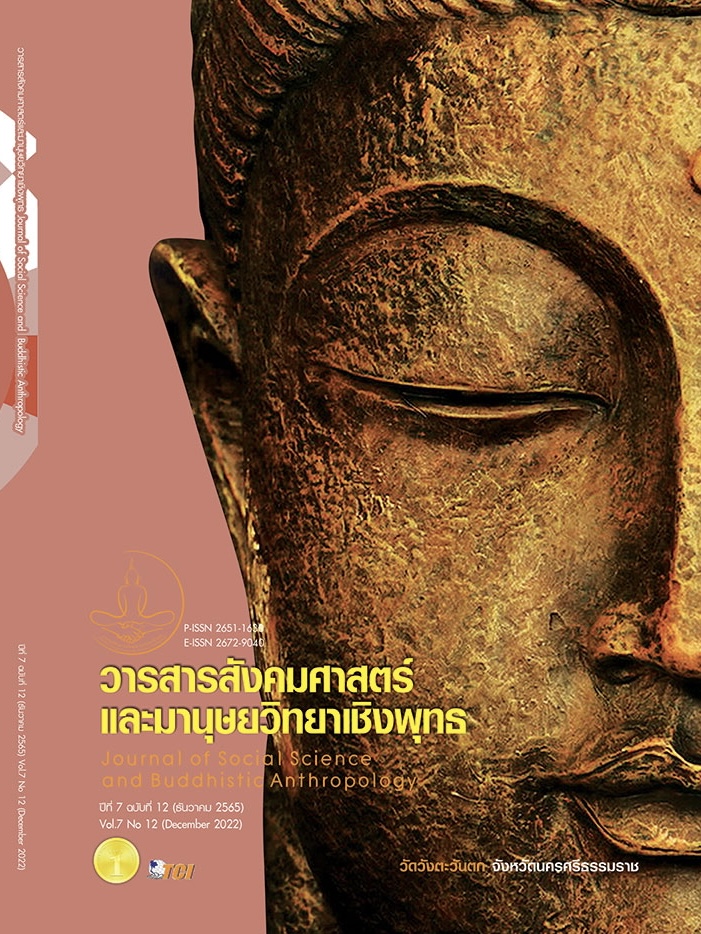MODEL FOR STRENGTHENING IN AN ANTI-CORRUPTION BY ACTIVITIES AND BUDDHIST PRINCIPLES IN CHIANG MAI PROVINCE
Keywords:
Model for Strengthening, Anti-Corruption, Activities and Buddhist PrinciplesAbstract
The objectives of this research were to 1) study the process of strengthening anti-corruption. by using activities and Buddhist principles in Chiang Mai 2) create a model to strengthen anti-corruption; 3) to present a model to strengthen anti-corruption; a mixed method research sample selected a specific sample group. Personnel from four educational institutions, Samakkhiwittayakanthan School, Mettasuksas School, Mahachulalongkorn Rajavidyalaya University Chiang Mai Campus, Mahamakut Buddhist University Lanna Campus. The results showed that Most of them were males aged 31-40 years, graduating with a bachelor's degree. in the line of work in the field of academic support personnel Most of the university employees and has never been trained There is a level of satisfaction about the strengthening process. and a model of strengthening anti-corruption at a high level 1) The process of strengthening anti-corruption found that within educational institutions there has never been any direct training or participation in training on strengthening anti-corruption. But within the organization, there are traditional activities. listening to sermons and various projects have been established that correspond to the strengthening of anti-corruption; 2) a model of strengthening anti-corruption; There should be a model for strengthening anti-corruption. by using activities and Buddhist principles as follows: 1) Strengthening model by promoting the organization of training activities as an annual plan; and 2) a model of networking between educational institutions. and Buddhist organizations and various projects have been established that correspond to the strengthening of anti-corruption; 2) a model of strengthening anti-corruption; There should be a model for strengthening anti-corruption. by using activities and Buddhist principles as follows: 1) Strengthening model by promoting the organization of training activities as an annual plan; and 2) a model of networking between educational institutions. and Buddhist organizations A model.
References
คณะกรรมการพัฒนาการเศรษฐกิจและสังคมแห่งชาติ. (2560). “แผนพัฒนาเศรษฐกิจและสังคมแห่งชาติ ฉบับที่ 12 พ.ศ. 2560-2564”. เรียกใช้เมื่อ 26 ตุลาคม 2563 จาก https://www.nesdc.go.th/ewt_dl_link.php?nid=6422
คณะกรรมการพัฒนาการเศรษฐกิจและสังคมแห่งชาติ. (2561). “ยุทธศาสตร์ชาติ ระยะ 20 ปี พ.ศ. 2561-2580”. เรียกใช้เมื่อ 26 ตุลาคม 2563 จาก https://www.nesdc. go.th/download/document/SAC/NS_PlanOct2018.pdf
ชุมแพ แสนยะบุตร และ ศุภวัฒนากร วงศ์ธนวสุ. (2560). การสร้างความเข้มแข็งให้กับชุมชนและภาคประชาชนต่อต้านการทุจริตขององค์กรชุมชน : กรณีศึกษาชุมชนในเขตเทศบาลตำบลกลางหมื่น อำเภอเมืองกาฬสินธุ์ จังหวัดกาฬสินธุ์. วารสารมหาวิทยาลัยนครพนม, 7(3), 53-62.
ประชาชาติธุรกิจ. (2565). 5 อันดับถูกร้องเรียนทุจริตมากที่สุด ยุคประยุทธ์ มหาดไทยนำโด่ง 503 เรื่อง. เรียกใช้เมื่อ 15 สิงหาคม 2565 จาก (https://www.prachachat.net/ politics/news-871377)
ประชาชาติธุรกิจ. (2565). ดัชนีรับรู้ทุจริตไทยปี 2564 คะแนนตก หล่นไปอยู่อันดับ 110 ของโลก. เรียกใช้เมื่อ 15 สิงหาคม 2565 จาก https://www.prachachat.net/ breaking-news/news-852409
พรเทพ จันทรนิภ. (2559). การพัฒนารูปแบบการป้องกนัการทุจริตคอร์รัปชั่น ในภาครัฐเพื่อการบริหารจัดการบ้านเมืองที่ดีในสังคมไทย. วารสารเกษมบัณฑิต, 16(1), 88-89.
วนิดา ชุมนุม. (2561). ธรรมาภิบาลแนวพุทธ: กรณีศึกษาองค์กรปกครองส่วนท้องถิ่นในประเทศไทย, คณะรัฐศาสตร์มหาวิทยาลัยรามคำแหง. วารสารเทคโนโลยีภาคใต้, 11(2), 1-14.
ศักดิ์สายันต์ ใยสามเสน และประทีป พืชทองหลาง. (2562). การพัฒนาคู่มือและสร้างเครือข่ายการสอนรายวิชาการต่อต้านการทุจริตในมหาวิทยาลัยในเขตภาคเหนือตอนบน. วารสารปัญญา, 26(2), 31-41.
ศิริวรรณ มนอัตระผดุง. (2555). สถานการณ์คอร์รัปชันของประเทศไทย. วารสารวไลยอลงกรณ์ ปริทรรศน์, 2(1), 1-9.
ศุภเยาว์ นาคเงินทอง และคณะ. (2561). การป้องกันการทุจริตในองค์กรปกครองส่วนท้องถิ่นด้วยกลไกพุทธบูรณาการ. วารสารมจร สังคมศาสตร์ปริทรรศน์, 7(2), 1-11.
องค์การบริหารส่วนจังหวัดเชียงใหม่. (2564). รายงานผลการดำเนินงานเรื่องร้องเรียน-ร้องทุกข์ ขององค์การบริหารส่วนจังหวัดเชียงใหม่ ประจำปี 2564. เรียกใช้เมื่อ 15 สิงหาคม 2565 จาก https://chiangmaipao.go.th/cmpao/article-detail/3309/
Chansarn, S. . (2013). Corruption and Income Inequality in Society: A Cross-Country Review. Songklanakarin Journal of Social Sciences and Humanities, 19(3), 35-59.
Downloads
Published
How to Cite
Issue
Section
License
Copyright (c) 2022 Journal of Social Science and Buddhistic Anthropology

This work is licensed under a Creative Commons Attribution-NonCommercial-NoDerivatives 4.0 International License.









